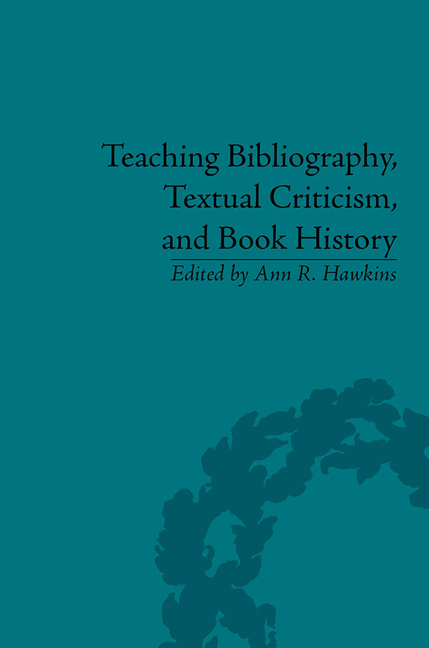Book contents
- Frontmatter
- Contents
- Notes on Contributors
- Foreword
- Introduction: Towards a pedagogy of Bibliography
- Part I Rationales
- Part II Creating and Using Resources
- Part III Methodologies
- Teaching ‘History of the Book’
- Preparing library school graduate students for Rare Book and Special Collections jobs: Assignments and Exercised that Work
- Book History and Library Education in the Twenty-first Century
- Making the Medicine Go Down: Baggy Monsters and Book History
- ‘They are Not Just Big, Dusty Novels’: Teaching Hard Times within the Context of Household Words
- ‘In a Bibleistic Way’: Teaching Nineteenth-Century American Poetry Through Book and Periodical Studies
- Teaching Bibliography and Research Methods
- Teaching Textual Criticism
- Part V Resources
- Index
Preparing library school graduate students for Rare Book and Special Collections jobs: Assignments and Exercised that Work
from Teaching ‘History of the Book’
- Frontmatter
- Contents
- Notes on Contributors
- Foreword
- Introduction: Towards a pedagogy of Bibliography
- Part I Rationales
- Part II Creating and Using Resources
- Part III Methodologies
- Teaching ‘History of the Book’
- Preparing library school graduate students for Rare Book and Special Collections jobs: Assignments and Exercised that Work
- Book History and Library Education in the Twenty-first Century
- Making the Medicine Go Down: Baggy Monsters and Book History
- ‘They are Not Just Big, Dusty Novels’: Teaching Hard Times within the Context of Household Words
- ‘In a Bibleistic Way’: Teaching Nineteenth-Century American Poetry Through Book and Periodical Studies
- Teaching Bibliography and Research Methods
- Teaching Textual Criticism
- Part V Resources
- Index
Summary
I had been teaching book history surreptitiously for years before I was lucky enough to teach it openly in the new Rare Book and Special Collections Concentration at the Palmer School of Library and Information Science of Long Island University. So secret was my pursuit that even I was barely aware of it. The discipline of ‘book history’ or ‘print culture’ was distinctly marginal when I began my academic career in the 1960s, identified then, and through the 1980s, as variously old-fashioned, elitist, antiquarian, and impractical. But having taught at four graduate schools of library and information science, I have developed a good sense of what works well in graduate settings and what doesn't.
First, I offer some ideas toward a pedagogy of book history. In teaching, book historians seem to agree on the importance of focusing upon detail in contrast to abstraction. That detail can be of several kinds: bibliographic description, collation and comparison, condition reports, provenance, pricing, hands-on experience with the elements of book-making and book-illustration. Yes, context – the times, the economy, and geography, and so forth – is important, but students learn such abstract concepts in most other areas of their academic preparation. Students in book history courses then must reorient from working deductively (from a priori assumptions) to working inductively (from physical evidence to such abstract concepts as authorship, meaning, and significance). This ability – to encounter an original item and make a case for it, either in financial or intellectual terms – is fundamental and essential for library science students. Yet for the most part, students lack experience with the tangible realities of evidence and the skills to work from the object to the interpretive level. In other words, they lack hands-on experience with books.
- Type
- Chapter
- Information
- Publisher: Pickering & ChattoFirst published in: 2014



